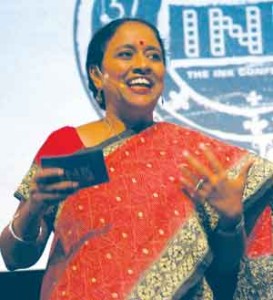 How do we tell a story in a way that creates impact? INK is nothing by itself; it takes shape in the hands of those who do something with it. For us, INK is a platform for global dialogue with an emphasis on idea exchange between India and the world. (www.inktalks.com. Lakshmi Pratury brought TED to India in 2009. The first TEDIndia conference was held in Mysore in December 2010) While I was in Intel I used to go to Ted – Technology, Entertainment and Design conferences. The founder Richard Saul Wurman, in 1983, felt all the technologists live in Silicon Valley, all the entertainers live in Los Angeles and all the designers live in New York and they are not meeting each other. Richard said that information is going to become huge and when this happens we need to create a different architecture. You need designers, artists to figure out how this information can be visualized.
How do we tell a story in a way that creates impact? INK is nothing by itself; it takes shape in the hands of those who do something with it. For us, INK is a platform for global dialogue with an emphasis on idea exchange between India and the world. (www.inktalks.com. Lakshmi Pratury brought TED to India in 2009. The first TEDIndia conference was held in Mysore in December 2010) While I was in Intel I used to go to Ted – Technology, Entertainment and Design conferences. The founder Richard Saul Wurman, in 1983, felt all the technologists live in Silicon Valley, all the entertainers live in Los Angeles and all the designers live in New York and they are not meeting each other. Richard said that information is going to become huge and when this happens we need to create a different architecture. You need designers, artists to figure out how this information can be visualized.
Great ideas come when you are exposed to things and have nothing to do with what you are doing. At some point I wanted to do something on my own and I thought why not do something like Ted in India. So I went to Ted and said I want to do it in India.
After I opened Ted in India it truly changed my life. Especially all across Asia amazing things were happening but we do not know how to tell our stories. We don’t talk enough about people like Suhas Gopinath (who started his web design venture when he was only 14) but we know what Bill Gates did. We haven’t done a great job of telling our stories in a way people can understand and put it on a platform that everybody can see. We need to do that.
Our conferences opened my eyes to the power of the black box that can tell stories in an unusual way and it reminded me at my time in Intel. You need to do things that are unusual in a way that it is uncomfortable. Only then you can be innovative. If everybody has figured out what to do and you are doing it too, it’s nothing much. That’s what excited me about Ink.
India is only 22 years old, if you start counting from 1991. In this country we have seen growth very fast but we haven’t learnt the tools of the trade. I felt there was an opportunity we have and that’s how Ink was born.
We have 200 stories in Ink, we are a very small company, and we hardly have a budget. Our talks are getting a lot of views because there is hunger for these kinds of stories among the youth here. Our goal is to tell 1000 stories in 10 different languages so that everybody can have access to the stories.
Discovering Fellows
To be truly innovative it’s not enough to get the knowledge; we need to enmesh ourselves into an experience where when we are listening to it we have nothing else to think about. When we do the conferences there is a certain experience that we want to create, and you need to be truly influenced at a certain core level to change. We have started something called Ink Fellows, these people are doing cutting edge things but the world hasn’t discovered them yet. Here are some:
Sunil Khandbahale from Nasik created an app where you can check dictionary in 10 different languages all through SMS. There are so many people living in villages who don’t know the languages. He has millions of people using his app.
Vicky Roy used to live on the street as a rag picker but today he is a world class photographer. He is going to MIT Media Labs to learn and expand his knowledge.
Subhendu Sharma used to be an engineer; he is now into afforestation. He says, give me 1000 sq ft of land I will convert it into a forest within 3 years. He wants to create urban forests.
These are the kind of people we are nurturing and getting them to a point that they are successful. We are moving from an industrial economy to a knowledge economy. We need to be better prepared, we need to go back to school for life. It’s not enough that we have a degree, that’s not going to take care of us for the next 40 years. We need to instill in colleges and corporations a certain way of thinking that we thought about things very differently instead of being just academic.
School for Life
Our vision is to build a platform for the knowledge economy. The Ink is a school for life. I came from Intel where I learnt all the time. There was never ever a time when I didn’t learn because every two years I changed my job. I would go into a new technology and start all over again. I would do all the research and present it to Andy Grove (Intel founder) and he would find a flaw in that argument because he has figured out a pattern of the vision not the content.
That’s what we need to learn, how do we create patterns? And how do we get out of the blinders we have. We need to have a different mindset. We need to create an atmosphere where we allow people to fail and learn from that and fail again. That’s how innovation happens. We do not have that right now.
We need to be okay to work in an atmosphere of uncertainty; it’s not that everything is decided and we know the market size. We need to do things we don’t know why or how but we need to do them anyway and make sure our vision comes true. We need to be confident of our skills.
We need to redefine success; today we define success in billions of dollars. We shouldn’t measure our lives with the number of breaths we take but the number of moments that take our breath away. The moment is a value, the moment is important; we all need to be billionaires of moments. We need to celebrate the billionaires of moments. We have not inherited the land from our ancestors but have borrowed it from our children, so let’s create a platform where we celebrate moments.





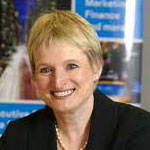
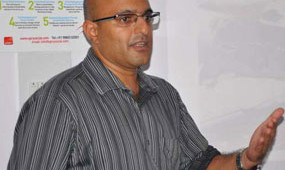
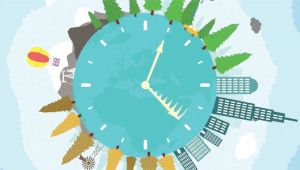

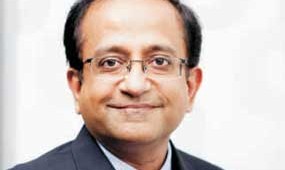

Recent Comments